California's war on plastic bag use seems to have backfired. Lawmakers are trying again
California's war on plastic bag use seems to have backfired. Lawmakers are trying again

California's war on plastic bag use seems to have backfired. Lawmakers are trying again

It was a decade ago when California became the first state in the nation to ban single-use plastic bags, ushering in a wave of anti-plastic legislation from coast to coast.
But in the years after California seemingly kicked its plastic grocery sack habit, material recovery facilities and environmental activists noticed a peculiar trend: Plastic bag waste by weight was increasing to unprecedented levels.
According to a report by the consumer advocacy group CALPIRG, 157,385 tons of plastic bag waste was discarded in California the year the law was passed. By 2022, however, the tonnage of discarded plastic bags had skyrocketed to 231,072 — a 47% jump. Even accounting for an increase in population, the number rose from 4.08 tons per 1,000 people in 2014 to 5.89 tons per 1,000 people in 2022.
The problem, it turns out, was a section of the law that allowed grocery stores and large retailers to provide thicker, heavier-weight plastic bags to customers for the price of a dime.